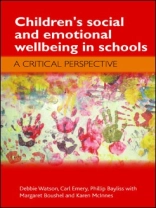This book challenges the concept of wellbeing as applied to children, particularly in a school-based context. Taking a post-structural approach, it suggests that wellbeing should be understood, and experiences revealed, at the level of the subjective child. This runs counter to contemporary accounts that reduce children’s wellbeing to objective lists of things that are needed in order to live well. This book will be useful for academics and practitioners working directly with children, and anyone interested in children’s wellbeing.
Innehållsförteckning
Section 1 Context: Introduction: Conceptual dimensions of wellbeing; Critical review of policy literature and concepts of wellbeing; Schools- current research findings/ trends/ concerns related to wellbeing; Section 2 Key issues: Inclusive Discourses in schools; Social and Emotional Dispositions and Skills- a way forward in understanding wellbeing?; Promoting positive relationships in schools; Play, playfulness and children’s wellbeing ~ Karen Mc Innes; Children’s rights and their contribution to wellbeing ~ Margaret Boushel; Professionals supporting wellbeing in schools; Section 3 Conceptions of wellbeing: towards a holistic discourse of wellbeing in schools; Social pedagogy and the promise for conceptions and practice of wellbeing in schools; Whose definition of wellbeing?; Conclusion.
Om författaren
Debbie Watson is a Senior Lecturer in Childhood Studies at the University of Bristol. She has experience in children’s social and emotional learning and children’s rights.
Carl Emery is a Lecturer in Social and Personal Development and Conflict Management. He teaches at Warwick University whilst completing his Ph D at Manchester University.
Phil Bayliss is a retired academic. He has researched inclusion with regard to interpersonal relationships and is now working as an independent educational developer in Europe.












